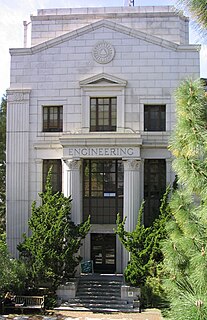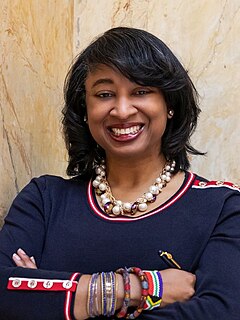
The University of California, Berkeley is a public land-grant research university in Berkeley, California. Established in 1868 as the University of California, it is the state's first land-grant university and the first campus of the University of California system. Its fourteen colleges and schools offer over 350 degree programs and enroll some 31,000 undergraduate and 12,000 graduate students. Berkeley is ranked among the world's top universities.
The Haas School of Business is the business school of the University of California, Berkeley. The first of its kind to be founded at a public university in the United States, it is ranked among the best business schools in the world by The Economist, Financial Times, QS World University Rankings, U.S. News & World Report, and Bloomberg Businessweek.

The College of Engineering, also known informally as Berkeley Engineering or CoE, is one of the fourteen schools and colleges at the University of California, Berkeley. Established in 1931, the college is considered among the most prestigious engineering schools in the world, ranked third by U.S. News & World Report and with an acceptance rate of 8%. Berkeley Engineering is particularly well known for producing many successful entrepreneurs; among its alumni are co-founders and CEOs of some of the largest companies in the world, including Apple, Boeing, Google, Intel, and Tesla.

The Directorate-General for Communications Networks, Content and Technology is a Directorate-General of the European Commission and is responsible for EU investment in research, innovation and development of critical digital technologies.
The Helen Wills Neuroscience Institute (HWNI) at the University of California, Berkeley was created in 1997, through a bequest from eight-time Wimbledon champion Helen Wills Moody, an alumna of UC Berkeley.
The Society for Women's Health Research (SWHR) is a national non-profit organization based in Washington D.C. SWHR is the thought leader in research on biological differences in disease and is dedicated to transforming women's health through science, advocacy, and education.
Paul J. D'Anieri is Professor of Public Policy and Political Science and former Executive Vice Chancellor & Provost of University of California, Riverside. Prior to his position at the UCR, Dr. D'Anieri served as the dean of the University of Florida College of Liberal Arts and Sciences (CLAS), from July 2008-June 2014 and the associate dean for humanities from 2004 to 2008 and associate dean for international programs from 1999 to 2003 at the University of Kansas.

The Institute of Development Studies (IDS) is a think tank affiliated with the University of Sussex in Brighton, England and based on its campus in Falmer, East Sussex. It delivers research and teaching in the area of development studies, for which it has a high reputation; and was also recognised as the number one international development think-tank in the 2019 Global Go To Think Tank Index Report.
The Commission on Private Philanthropy and Public Needs, better known as the Filer Commission, was formed in 1973 to study philanthropy, the role of the private sector in American society, and then to recommend measures to increase voluntary giving. Organized as a privately supported citizen's board, the Commission came into being through the efforts of John D. Rockefeller III, Wilbur D. Mills, George P. Shultz, and William E. Simon. The selection of participants on the Commission reflected a desire for diversity of experience and opinions and included heads of religious and labor groups, former cabinet secretaries, corporate and fd Foreign Securities Corporation and President of Metropolitan Museum of Art.
- Edwin D. Etherington, Former President of Wesleyan University and Trustee of Alfred P. Sloan Foundation.
- Bayard Ewing, Tillinghast, Collins and Graham and Vice Chairman of United Way of America.
- Frances Tarlton Farenthold, Past Chairperson of National Women's Political Caucus.
- Max M. Fisher, Chairman of United Brands Company and Honorary Chairman of United Foundations.
- Reverend Raymond J. Gallagher, Bishop of Lafayette-in-Indiana.
- Earl G. Graves, Publisher of Black Enterprise and Commissioner of Boy Scouts of America.
- Paul R. Haas, President and Chairman of Corpus Christi Oil and Gas Company and Trustee of Paul and Mary Haas Foundation.
- Walter A. Haas Jr., Chairman of Levi Strauss and Company and Trustee of the Ford Foundation.
- Philip M. Klutznick, Klutznick Investments and Chairman of Research and Policy Committee and Trustee of Committee for Economic Development.
- Ralph Lazarus, Chairman of Federated Department Stores, Inc. and Former National Chairman of United Way of America.
- Herbert E. Longenecker, President Emeritus of Tulane University and Director of United Student Aid Funds.
- Elizabeth J. McCormack, Special Assistant to the President of Rockefeller Brothers Fund, Inc.
- Walter J. McNerney, President of Blue Cross Association.
- William H. Morton, Trustee of Dartmouth College.
- John M. Musser, President and Director of General Service Foundation.
- Jon O. Newman, Judge, U.S. District Court and Chairman of Hartford Institute of Criminal and Social Justice.
- Graciela Olivarez, State Planning Officer and Director of Council on Foundations, Inc.
- Alan Pifer, President of Carnegie Corporation of New York.
- George Romney, Chairman of the National Center for Voluntary Action.
- William Matson Roth, Regent of University of California and Chairman of San Francisco Museum of Art.
- Althea T. L. Simmons, Director for Education Programs of the NAACP Special Contribution Fund.
- Reverend Leon H. Sullivan, Pastor of Zion Baptist Church, Philadelphia.
- David B. Truman, President of Mount Holyoke College.

The Health Initiative of the Americas is a Latino program focusing mainly on migrant and immigrant health issues. It is part of the School of Public Health at the University of California, Berkeley (UCB).
john a. powell is an African-American law professor. He leads the UC Berkeley Othering & Belonging Institute and holds the Robert D. Haas Chancellor's Chair in Equity and Inclusion, Professor of Law and Professor of African American Studies and Ethnic Studies at the University of California, Berkeley School of Law. powell spells his name in lowercase based on the idea that we should be "part of the universe, not over it, as capitals signify".
The Institute of Governmental Studies (IGS) is an interdisciplinary organized research unit at UC Berkeley, located in Moses Hall. It was founded in 1919 as the Bureau of Public Administration. IGS and its affiliated centers spearhead and promote research, programs, seminars and colloquia, training, educational activities and public service in the fields of politics and public policy, with a strong focus on national and California politics. Current IGS research focuses include institutional policy and design, political reform, term limits, campaign finance, redistricting, direct democracy, presidential and gubernatorial politics, representative government, the politics of race and ethnicity, immigration and globalization.

The Center for Women in Government & Civil Society (CWGCS) is a policy research center at the Rockefeller College of Public Affairs and Policy, University at Albany (SUNY). CWGCS was founded in 1978, and is a member organization of The National Council for Research on Women.

The Canadian Centre for Diversity and Inclusion French: Centre canadien pour la diversité et l'inclusion is a national charitable organization with the mandate to help the individuals and organizations they work with be inclusive, and free of prejudice and discrimination – and to generate the awareness, dialogue and action for people to recognize diversity as an asset and not an obstacle.

The UCLA Institute for Research on Labor and Employment (IRLE) is an interdisciplinary research unit within the College of Letters & Science, Division of Social Science, dedicated to research, teaching, and discussion of labor and employment issues. It was founded in 1945 as the UCLA Institute of Industrial Relations. It is one of the two research programs in the University of California system along with the UC Berkeley Institute for Research on Labor and Employment. The IRLE consists of four bodies: the IRLE Academic Unit, UCLA Labor Center, Human Resources Round Table, and the Labor Occupational Safety and Health Program.
Joan Y. Reede is an American physician. She is Harvard Medical School's inaugural dean for diversity and community partnership, and a member of the National Academy of Medicine. She is known for creating programs that mentor and support minority physicians and female physicians. Alumni of her programs have created a 501(c)(3) organization called The Reede Scholars in her honor.

Renetta Garrison Tull is an American electrical engineer, global policy strategist, and works to advance diversity and inclusion in science, technology, engineering, and mathematics (STEM). Tull is the inaugural Vice Chancellor of Diversity, Equity, and Inclusion at University of California, Davis and a founding Director of the National Science Foundation funded program PROMISE: Alliances for Graduate Education and Professoriate, which aims to increase the number of underrepresented students in STEM. Tull previously served as Vice Provost for Strategic Initiatives at the University of Maryland, Baltimore County (UMBC) and was also the Director of Graduate and Professional Pipeline Development for the University System of Maryland (USM) where she also served as the co-Principal Investigator and co-director of the Louis Stokes Alliance for Minority Participation. On a global scale, Tull was selected as the keynote speaker for the United Nations Educational, Scientific and Cultural Organization (UNESCO) event on the Commission on the Status of Women in Engineering Fields, and was the only American and only female finalist for the Global Engineering Deans Council Airbus Diversity Award in 2015.
Sarita Yardi Schoenebeck is an American computer scientist at the University of Michigan, where she serves as Director of the Living Online Lab. Her research considers human–computer interactions, social media and social computing. She was awarded the University of Michigan School of Information Diversity, Equity and Inclusion Award in 2017 for her work on LGBTQ+ families and online communities.
Kimberly Sherell Johnson is an American clinical investigator. She is a Full professor of medicine at Duke University and director of Duke REACH Equity. In March 2020, Johnson’s academic work was recognized with the first Richard Payne Outstanding Achievement in Diversity, Equity and Inclusion Award from the American Academy of Hospice and Palliative Medicine.
Diversity, equity, and inclusion (DEI) is a term most used to describe a training format in the workplace. DEI training is utilized to encourage functional knowledge of fellow employees' identities and how to navigate diversity in an organization. That said, the concept of DEI has a much broader scope of application. “Diversity” describes a wide variety of differences that may exist amongst people in any setting, including race, ethnicity, nationality, gender and sexual identity, disability, neurodiversity, and others. This is the cause of the need for DEI awareness. “Equity” is the concept of providing equal opportunities through a personalized approach, utilizing unequal distribution of resources to ‘level the playing field.’ Applying equity includes factoring in a variety of disparities within society that affect individuals to varying levels. Equity is the application of principles encapsulated by DEI. “Inclusion” details the desired outcome; ensuring that those who fall under the title of “diverse” genuinely feel safe, welcome, and included. Inclusion is a step past integration, where diverse individuals blend completely into the environment without a second thought. Due to the complexity of these issues in society, DEI is not simple or cookie-cutter. Though DEI is best known as a form of corporate training, these angles must be explored in a variety of environments, including but not limited to academia, corporate workplaces, schools, and medical spaces.








